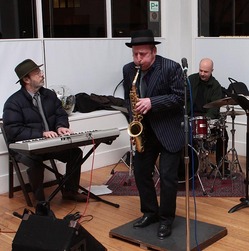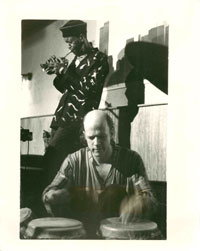Jazz beyond Jazz: February 2009 Archives
Thanks to President Barack Obama, January-February 2009 has been a great time for American popular music. It's well known he's got big ears. But Pete Seeger, Bruce Springsteen and Herbie Hancock at the Lincoln Memorial, Aretha Franklin singing at the Inauguration, Paul Simon and Esperanza Spaulding among those paying tribute to Stevie Wonder, winner of the Library of Congress' Gershwin Prize -- who himself tore it up on "Superstition" and "Signed, Sealed and Delivered" -- at the White House!?! What other U.S. leader has so valued and spotlit our internationally popular vernacular music? 

Continue reading Big Ears in the White House: Obama's boomer soul, and predecessors.
The Master Musicians of Jajouka, a troupe from Morocco's Rif Mountains, stretch anyone's definition of "jazz." They sure don't make the cut according to alto saxophonist Lou Donaldson, who regaled the crowd attending his "Jazz Conversation" at the PDX Jazz Festival (Portland OR) with the opinion that he's the only real "jazz" artist on the sched during the fest's second weekend, dissing saxophonists Eric Dolphy, Ornette Coleman and Tom Scott, among others, as having "nothing to do with jazz" slighting Frank Morgan as a "phony" and Cannonball Adderley as "not all they said he was."

Such comments didn't keep the fest's Friday night jam session from having a tap-dancing alto sax player who calls himself Shoehorn (photo slideshow here by R. Andrew Lepley) do a tune,

or audiences from sitting raptly for arch cabaretiste Patricia Barber, the Spirits of Havana quintet led by Canadian sax-and-flutist Jane Bunnett, electric guitarist Pat Martino's organ trio. Out of such disparate entertainments, festivity is born.
Continue reading Jajouka-beyond-jazz, public interviews and local acts at Portland fest.
A new hole in the safety net for jazz musicians: In an e-mail message sent February 18, Jazz Foundation of America executive director Wendy Oxenhorn reports:
Our magnificent E*TRADE Emergency Housing Fund has allowed us to pay rents and mortgages all these years when elderly musicians fell ill, and when Katrina struck. Because of this fund we have never lost anyone to homelessness or eviction in the past 8 years! What ETRADE did for us all these years was amazing but we have just been told that they can no longer support our program going forward. Without their contribution our Emergency Fund is now at an all time low.
Jazz musicians in the United States almost never have pensions and seldom get health insurance through employers (I bet that's the case for most American rap, rock, pop, polka, folk, country and probably the majority of classical musicians, too). At the JFA's Great Night In Harlem fundraiser held August 29, 2001, R. Jarrett Lilien, then Chief Operating Officer of E*Trade Financial and now President of the Jazz Foundation, announced the establishment of a standing fund to provide assistance to musicians in need. The JFA claims that since Hurricane Katrina hit in 2005, more than 3500 musicians have been helped with these monies. With E*Trade bowing out, the JFA seeks a new $150,000 sponsor for its housing fund.
Continue reading Safety net tears: E*Trade ends emergency funds for jazz musicians.
The PDX Jazz Festival in Portland, Oregon last week began to garner good reviews for its programs, many of which celebrate the 70th anniversary of the founding of Blue Note Records. Yet as the first major jazz festival of 2009, it may be the canary in the coalmine regarding effects of the economic downturn. Last fall Alaska Airlines rescued the fest from folding after its major funder, Seattle-based Qwest Communications, pulled out, having been one of the decade's 25-worst performing S&P 500 Index stocks. Now, according to PDX Jazz artistic director Bill Royston, severely disappointing ticket sales forced his cancellation of a major show scheduled for Friday 2/20 headlined by singer Cassandra Wilson, with pianist Jason Moran's band as an opening act.
"I've never cancelled a show before in 30 years," Royston told me, continuing, "Other than sales, which are somewhat down across the boards, we're doing fine."
Continue reading Portland jazz fest hails Blue Note, cancels Cassandra .
Al Green, age 62, won two Grammy awards last week -- Best R&B Performance by a Duo for "Stay with Me (By the Sea)" and Best Traditional R&B Vocal Performance for "You've Got The Love I Need" -- and of course out-classed Justin Timberlake on the televised award program singing his 1972 classic "Let's Stay Together."
 Both Green and Rollins are captured at the earlier career peaks by documentarian Robert Mugge -- who I spoke to recently -- in his movies The Gospel According to Al Green and Sonny Rollins, Saxophone Colossus, from 1984 and 1986 respectively, newly available on DVD by Acorn Media.
Both Green and Rollins are captured at the earlier career peaks by documentarian Robert Mugge -- who I spoke to recently -- in his movies The Gospel According to Al Green and Sonny Rollins, Saxophone Colossus, from 1984 and 1986 respectively, newly available on DVD by Acorn Media.
Sonny Rollins, 78, won Record of the Year in the VIllage Voice's 3rd annual jazz critics' poll, with Road Shows Vol. 1 (which made my 2008 10-best list) and resumes touring in April with concerts in Arkansas, Miami and California.
 Both Green and Rollins are captured at the earlier career peaks by documentarian Robert Mugge -- who I spoke to recently -- in his movies The Gospel According to Al Green and Sonny Rollins, Saxophone Colossus, from 1984 and 1986 respectively, newly available on DVD by Acorn Media.
Both Green and Rollins are captured at the earlier career peaks by documentarian Robert Mugge -- who I spoke to recently -- in his movies The Gospel According to Al Green and Sonny Rollins, Saxophone Colossus, from 1984 and 1986 respectively, newly available on DVD by Acorn Media.
Continue reading Al Green and Sonny Rollins, now and then .
Eddie Palmieri, the genius and prophet of Afro-Caribbean jazz, showed Herbie Hancock, maybe Wynton Marsalis and certainly the roaring audience at Jazz at Lincoln Center's Rose Hall a thing or three last weekend. His band La Perfecta II, reconstituting the instrumentation and compositions for mambo, cha-cha and pachanga dancing Palmieri introduced in 1961, blew the lid off the joint as I've heard no other band do since it opened in 2004, establishing Latin music's clavé rhythm for all time at the core of what Marsalis likes to call "the house that swing built."
Swing they did, La Perfecta, swing hard, with style, precision and vengeance much more driving, cool and fiery than anything else taken for swing today. If only the Rose Hall seats could have been pushed aside for dancing. Swing, swivel, dip, cut, twist, step, shift, glide, gesture -- faster, faster, faster -- in perfect syncopation with the polyrhythmic percussion, the riffing trombones and trumpet, the steely-plucked trés and full-bodied but sparely applied flute.
Palmieri at the piano -- age 73, dapper in suit and yellow tie, busy cueing his horns, supporting his elegant yet impassioned male singers, goosing the tempo kept by his deft young bassist and veteran conga player, breaking into unpredictably funky or classical, flowing or staggered keyboard solos -- is probably the last surviving bandleader in America today who makes "swing" transcend its historic import to render big band virtuosity, intensity and density at highest speeds more immediate than tomorrow's pop. His music isn't contemporary, it's immediate, and thus timeless.
He expands on an extraordinary American idiom -- check out this clip from a Fania All-Stars session of Palmieri, the "Sun of Latin Music" with fellow keyboardists Larry Harlow and Papo Lucca, Johnny Pacheco playing flute and Ismael Quintana singing lead:
Continue reading Eddie Palmieri sets Jazz at Lincoln Center afire.
Attempts to revisit the music of an extraordinary improviser work all too infrequently, if "work" means evoking something close to the living presence of the player him-or-herself. This is true even when the tribute-payers are the tributee's collaborators, bearing the best intentions.
But "In the Spirit of Don Cherry," an all-star octet organized by pianist Karl Berger was able at a Symphony Space performance a couple weeks back to imbue seldom-heard yet unusually memorable songs with the wit, grace and world-ranging musicality of the man who created them (playing pocket trumpet with Collin Walcott, tabla in this photo by Lona Foote).

Berger, the force behind the legendary, influential and under-reported Creative Music Studio of Woodstock -- with trumpeter/cornetist Graham Haynes, tenor saxophonist Peter Apfelbaum, tubaist Bob Stewart, guitarist Kenny Wessel, bassist Mark Helias, drummer Tani Tabal and vocalist Ingrid Sertso -- performed tunes Cherry included in his great albums of suites Complete Communion and Symphony for Improvisers (both on celebrated Blue Note Records, from 1965 and '66, respectively) as well as a couple recorded elsewhere, like "Art Deco," title track of a 1986 album. True to its name, the concert's operative plan was "in the spirit of . . ." rather than "note-for-note." The musicians, most of whom had worked directly with Cherry, evoked the beauty, playfulness, pathos, imagination, unforced complexity and constant interactivity he tapped in himself and others by blowing as if they were onstage with him.
Continue reading A visitation with Don Cherry's spirit.